How to Encourage People to Eat a Nutritionally Sound Meal
VerifiedAdded on 2020/03/01
|8
|2433
|189
Report
AI Summary
This report explores the critical importance of nutritionally sound meals for people of all ages, highlighting the challenges in achieving a balanced diet. It presents a case study of an elderly woman, Miss E, who faces various obstacles to healthy eating, including age-related changes, limited mobility, and socio-economic constraints. The report applies Practice Development and Collaborative, Inclusive, and Participatory (CIP) principles to address Miss E's needs, emphasizing dignity, responsibility, and patient involvement. It discusses the impact of social isolation and loneliness on dietary habits and proposes solutions such as encouraging social eating and recommending dietary adjustments. The report also addresses the role of physical activity, medical power of attorney, and communication in promoting healthy eating habits. It concludes by emphasizing the importance of a multifaceted approach to address the complex factors influencing nutritional intake and weight loss, ensuring patient-centered care and the involvement of family and carers in decision-making.
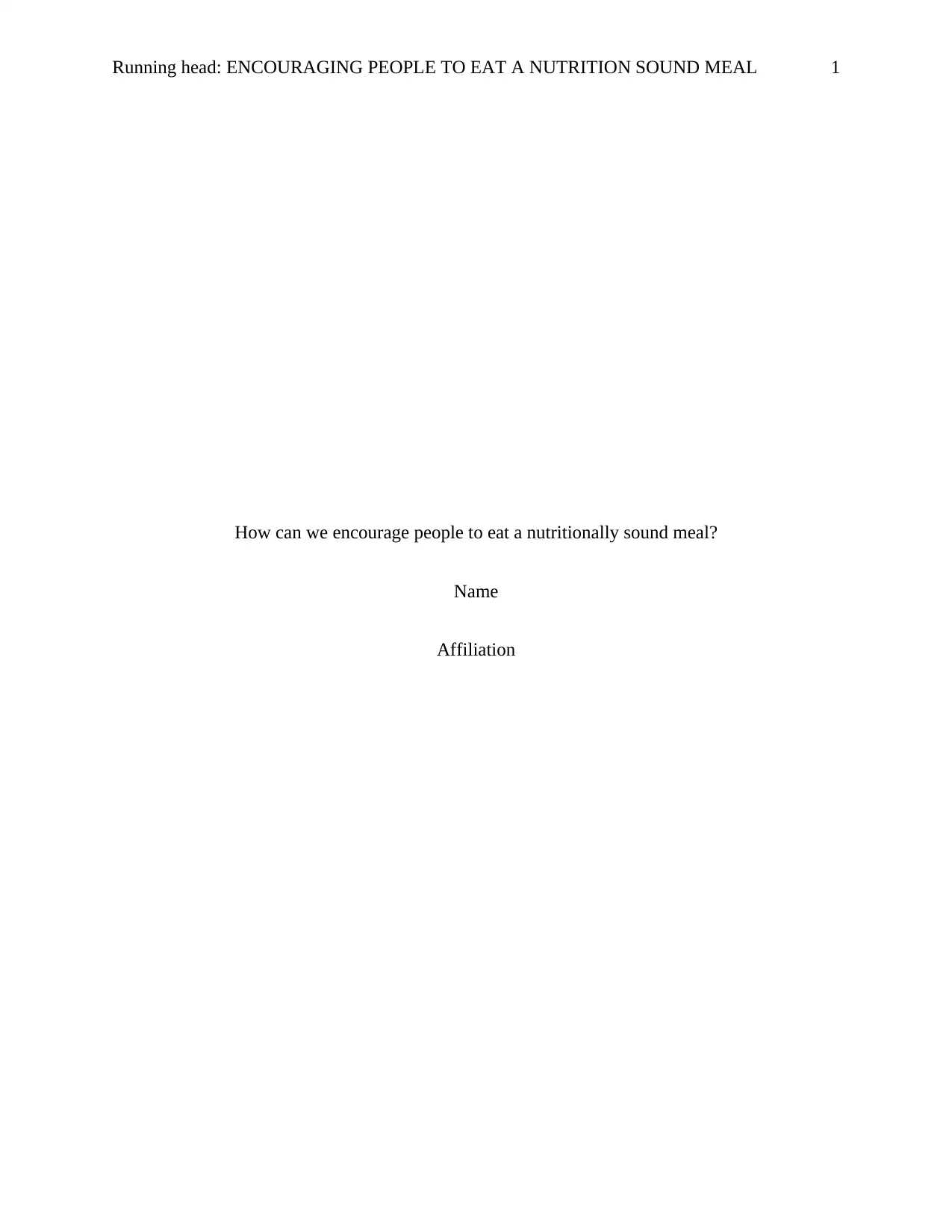
Running head: ENCOURAGING PEOPLE TO EAT A NUTRITION SOUND MEAL 1
How can we encourage people to eat a nutritionally sound meal?
Name
Affiliation
How can we encourage people to eat a nutritionally sound meal?
Name
Affiliation
Paraphrase This Document
Need a fresh take? Get an instant paraphrase of this document with our AI Paraphraser
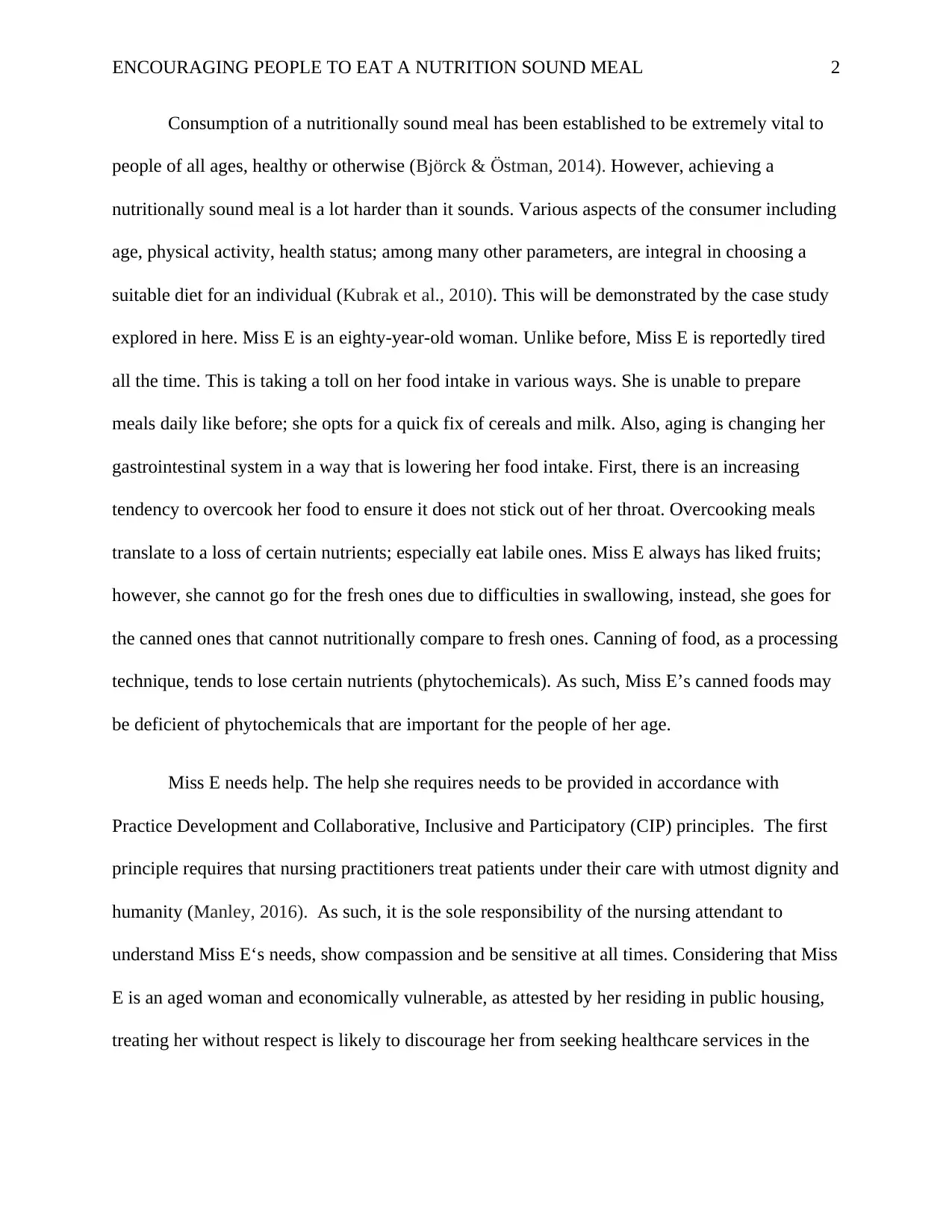
ENCOURAGING PEOPLE TO EAT A NUTRITION SOUND MEAL 2
Consumption of a nutritionally sound meal has been established to be extremely vital to
people of all ages, healthy or otherwise (Björck & Östman, 2014). However, achieving a
nutritionally sound meal is a lot harder than it sounds. Various aspects of the consumer including
age, physical activity, health status; among many other parameters, are integral in choosing a
suitable diet for an individual (Kubrak et al., 2010). This will be demonstrated by the case study
explored in here. Miss E is an eighty-year-old woman. Unlike before, Miss E is reportedly tired
all the time. This is taking a toll on her food intake in various ways. She is unable to prepare
meals daily like before; she opts for a quick fix of cereals and milk. Also, aging is changing her
gastrointestinal system in a way that is lowering her food intake. First, there is an increasing
tendency to overcook her food to ensure it does not stick out of her throat. Overcooking meals
translate to a loss of certain nutrients; especially eat labile ones. Miss E always has liked fruits;
however, she cannot go for the fresh ones due to difficulties in swallowing, instead, she goes for
the canned ones that cannot nutritionally compare to fresh ones. Canning of food, as a processing
technique, tends to lose certain nutrients (phytochemicals). As such, Miss E’s canned foods may
be deficient of phytochemicals that are important for the people of her age.
Miss E needs help. The help she requires needs to be provided in accordance with
Practice Development and Collaborative, Inclusive and Participatory (CIP) principles. The first
principle requires that nursing practitioners treat patients under their care with utmost dignity and
humanity (Manley, 2016). As such, it is the sole responsibility of the nursing attendant to
understand Miss E‘s needs, show compassion and be sensitive at all times. Considering that Miss
E is an aged woman and economically vulnerable, as attested by her residing in public housing,
treating her without respect is likely to discourage her from seeking healthcare services in the
Consumption of a nutritionally sound meal has been established to be extremely vital to
people of all ages, healthy or otherwise (Björck & Östman, 2014). However, achieving a
nutritionally sound meal is a lot harder than it sounds. Various aspects of the consumer including
age, physical activity, health status; among many other parameters, are integral in choosing a
suitable diet for an individual (Kubrak et al., 2010). This will be demonstrated by the case study
explored in here. Miss E is an eighty-year-old woman. Unlike before, Miss E is reportedly tired
all the time. This is taking a toll on her food intake in various ways. She is unable to prepare
meals daily like before; she opts for a quick fix of cereals and milk. Also, aging is changing her
gastrointestinal system in a way that is lowering her food intake. First, there is an increasing
tendency to overcook her food to ensure it does not stick out of her throat. Overcooking meals
translate to a loss of certain nutrients; especially eat labile ones. Miss E always has liked fruits;
however, she cannot go for the fresh ones due to difficulties in swallowing, instead, she goes for
the canned ones that cannot nutritionally compare to fresh ones. Canning of food, as a processing
technique, tends to lose certain nutrients (phytochemicals). As such, Miss E’s canned foods may
be deficient of phytochemicals that are important for the people of her age.
Miss E needs help. The help she requires needs to be provided in accordance with
Practice Development and Collaborative, Inclusive and Participatory (CIP) principles. The first
principle requires that nursing practitioners treat patients under their care with utmost dignity and
humanity (Manley, 2016). As such, it is the sole responsibility of the nursing attendant to
understand Miss E‘s needs, show compassion and be sensitive at all times. Considering that Miss
E is an aged woman and economically vulnerable, as attested by her residing in public housing,
treating her without respect is likely to discourage her from seeking healthcare services in the
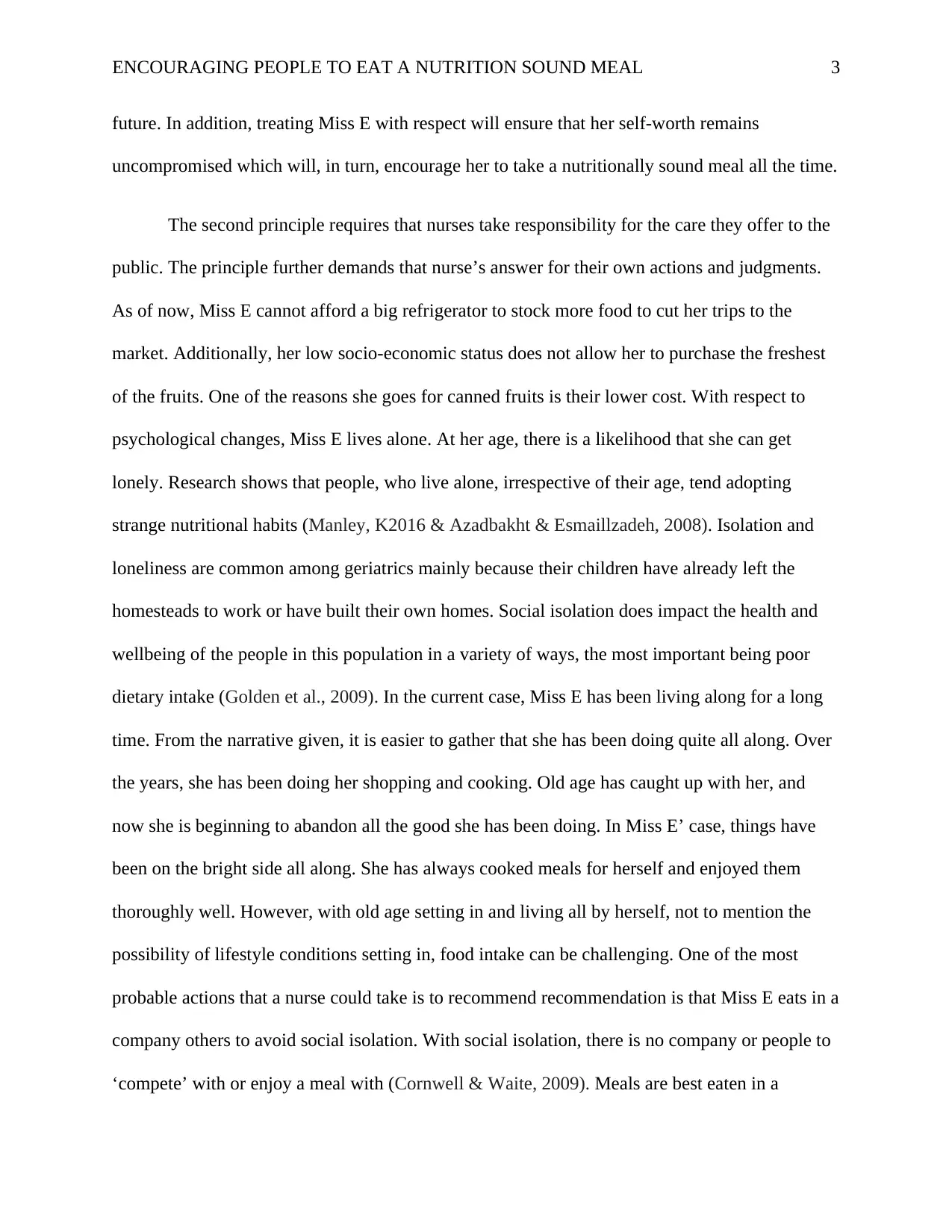
ENCOURAGING PEOPLE TO EAT A NUTRITION SOUND MEAL 3
future. In addition, treating Miss E with respect will ensure that her self-worth remains
uncompromised which will, in turn, encourage her to take a nutritionally sound meal all the time.
The second principle requires that nurses take responsibility for the care they offer to the
public. The principle further demands that nurse’s answer for their own actions and judgments.
As of now, Miss E cannot afford a big refrigerator to stock more food to cut her trips to the
market. Additionally, her low socio-economic status does not allow her to purchase the freshest
of the fruits. One of the reasons she goes for canned fruits is their lower cost. With respect to
psychological changes, Miss E lives alone. At her age, there is a likelihood that she can get
lonely. Research shows that people, who live alone, irrespective of their age, tend adopting
strange nutritional habits (Manley, K2016 & Azadbakht & Esmaillzadeh, 2008). Isolation and
loneliness are common among geriatrics mainly because their children have already left the
homesteads to work or have built their own homes. Social isolation does impact the health and
wellbeing of the people in this population in a variety of ways, the most important being poor
dietary intake (Golden et al., 2009). In the current case, Miss E has been living along for a long
time. From the narrative given, it is easier to gather that she has been doing quite all along. Over
the years, she has been doing her shopping and cooking. Old age has caught up with her, and
now she is beginning to abandon all the good she has been doing. In Miss E’ case, things have
been on the bright side all along. She has always cooked meals for herself and enjoyed them
thoroughly well. However, with old age setting in and living all by herself, not to mention the
possibility of lifestyle conditions setting in, food intake can be challenging. One of the most
probable actions that a nurse could take is to recommend recommendation is that Miss E eats in a
company others to avoid social isolation. With social isolation, there is no company or people to
‘compete’ with or enjoy a meal with (Cornwell & Waite, 2009). Meals are best eaten in a
future. In addition, treating Miss E with respect will ensure that her self-worth remains
uncompromised which will, in turn, encourage her to take a nutritionally sound meal all the time.
The second principle requires that nurses take responsibility for the care they offer to the
public. The principle further demands that nurse’s answer for their own actions and judgments.
As of now, Miss E cannot afford a big refrigerator to stock more food to cut her trips to the
market. Additionally, her low socio-economic status does not allow her to purchase the freshest
of the fruits. One of the reasons she goes for canned fruits is their lower cost. With respect to
psychological changes, Miss E lives alone. At her age, there is a likelihood that she can get
lonely. Research shows that people, who live alone, irrespective of their age, tend adopting
strange nutritional habits (Manley, K2016 & Azadbakht & Esmaillzadeh, 2008). Isolation and
loneliness are common among geriatrics mainly because their children have already left the
homesteads to work or have built their own homes. Social isolation does impact the health and
wellbeing of the people in this population in a variety of ways, the most important being poor
dietary intake (Golden et al., 2009). In the current case, Miss E has been living along for a long
time. From the narrative given, it is easier to gather that she has been doing quite all along. Over
the years, she has been doing her shopping and cooking. Old age has caught up with her, and
now she is beginning to abandon all the good she has been doing. In Miss E’ case, things have
been on the bright side all along. She has always cooked meals for herself and enjoyed them
thoroughly well. However, with old age setting in and living all by herself, not to mention the
possibility of lifestyle conditions setting in, food intake can be challenging. One of the most
probable actions that a nurse could take is to recommend recommendation is that Miss E eats in a
company others to avoid social isolation. With social isolation, there is no company or people to
‘compete’ with or enjoy a meal with (Cornwell & Waite, 2009). Meals are best eaten in a
⊘ This is a preview!⊘
Do you want full access?
Subscribe today to unlock all pages.

Trusted by 1+ million students worldwide
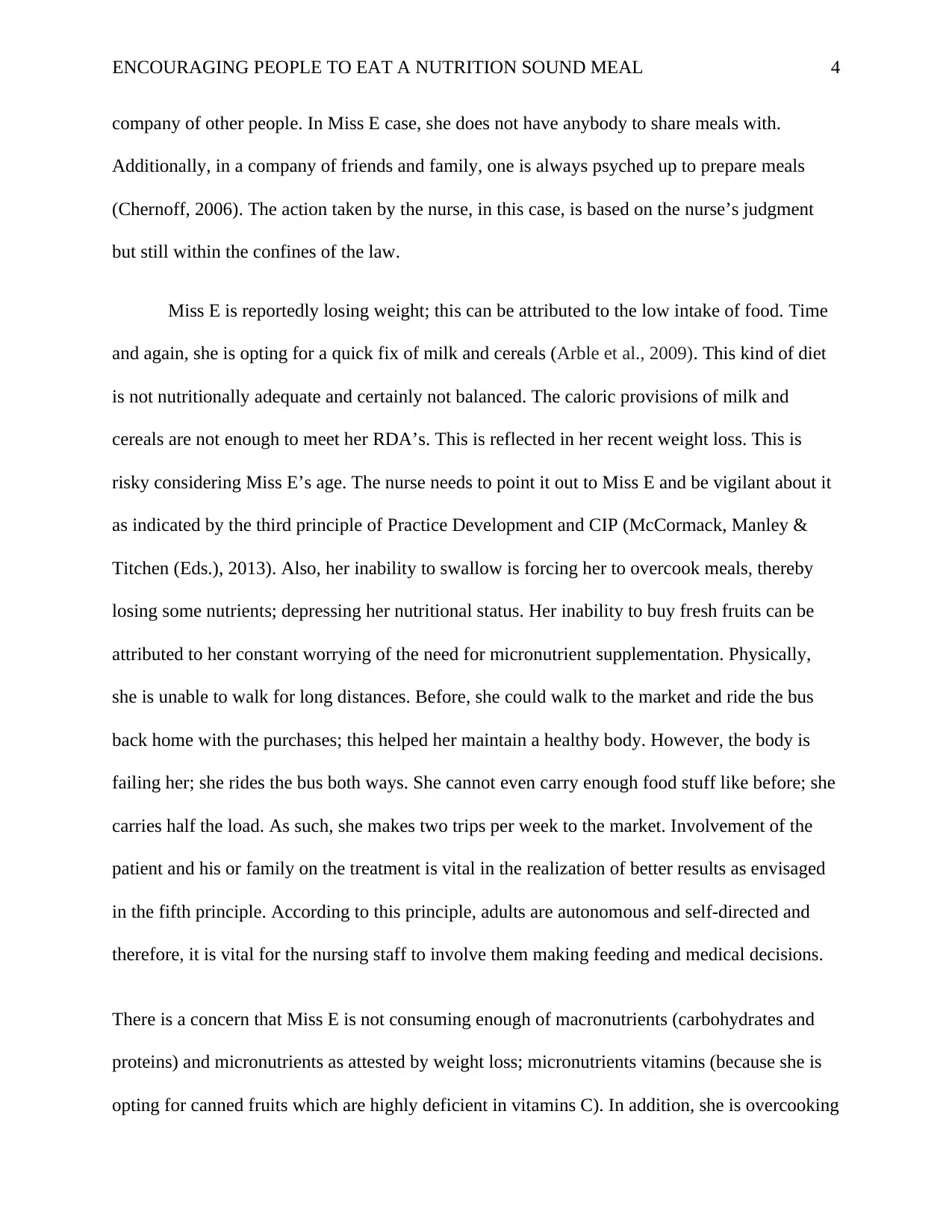
ENCOURAGING PEOPLE TO EAT A NUTRITION SOUND MEAL 4
company of other people. In Miss E case, she does not have anybody to share meals with.
Additionally, in a company of friends and family, one is always psyched up to prepare meals
(Chernoff, 2006). The action taken by the nurse, in this case, is based on the nurse’s judgment
but still within the confines of the law.
Miss E is reportedly losing weight; this can be attributed to the low intake of food. Time
and again, she is opting for a quick fix of milk and cereals (Arble et al., 2009). This kind of diet
is not nutritionally adequate and certainly not balanced. The caloric provisions of milk and
cereals are not enough to meet her RDA’s. This is reflected in her recent weight loss. This is
risky considering Miss E’s age. The nurse needs to point it out to Miss E and be vigilant about it
as indicated by the third principle of Practice Development and CIP (McCormack, Manley &
Titchen (Eds.), 2013). Also, her inability to swallow is forcing her to overcook meals, thereby
losing some nutrients; depressing her nutritional status. Her inability to buy fresh fruits can be
attributed to her constant worrying of the need for micronutrient supplementation. Physically,
she is unable to walk for long distances. Before, she could walk to the market and ride the bus
back home with the purchases; this helped her maintain a healthy body. However, the body is
failing her; she rides the bus both ways. She cannot even carry enough food stuff like before; she
carries half the load. As such, she makes two trips per week to the market. Involvement of the
patient and his or family on the treatment is vital in the realization of better results as envisaged
in the fifth principle. According to this principle, adults are autonomous and self-directed and
therefore, it is vital for the nursing staff to involve them making feeding and medical decisions.
There is a concern that Miss E is not consuming enough of macronutrients (carbohydrates and
proteins) and micronutrients as attested by weight loss; micronutrients vitamins (because she is
opting for canned fruits which are highly deficient in vitamins C). In addition, she is overcooking
company of other people. In Miss E case, she does not have anybody to share meals with.
Additionally, in a company of friends and family, one is always psyched up to prepare meals
(Chernoff, 2006). The action taken by the nurse, in this case, is based on the nurse’s judgment
but still within the confines of the law.
Miss E is reportedly losing weight; this can be attributed to the low intake of food. Time
and again, she is opting for a quick fix of milk and cereals (Arble et al., 2009). This kind of diet
is not nutritionally adequate and certainly not balanced. The caloric provisions of milk and
cereals are not enough to meet her RDA’s. This is reflected in her recent weight loss. This is
risky considering Miss E’s age. The nurse needs to point it out to Miss E and be vigilant about it
as indicated by the third principle of Practice Development and CIP (McCormack, Manley &
Titchen (Eds.), 2013). Also, her inability to swallow is forcing her to overcook meals, thereby
losing some nutrients; depressing her nutritional status. Her inability to buy fresh fruits can be
attributed to her constant worrying of the need for micronutrient supplementation. Physically,
she is unable to walk for long distances. Before, she could walk to the market and ride the bus
back home with the purchases; this helped her maintain a healthy body. However, the body is
failing her; she rides the bus both ways. She cannot even carry enough food stuff like before; she
carries half the load. As such, she makes two trips per week to the market. Involvement of the
patient and his or family on the treatment is vital in the realization of better results as envisaged
in the fifth principle. According to this principle, adults are autonomous and self-directed and
therefore, it is vital for the nursing staff to involve them making feeding and medical decisions.
There is a concern that Miss E is not consuming enough of macronutrients (carbohydrates and
proteins) and micronutrients as attested by weight loss; micronutrients vitamins (because she is
opting for canned fruits which are highly deficient in vitamins C). In addition, she is overcooking
Paraphrase This Document
Need a fresh take? Get an instant paraphrase of this document with our AI Paraphraser
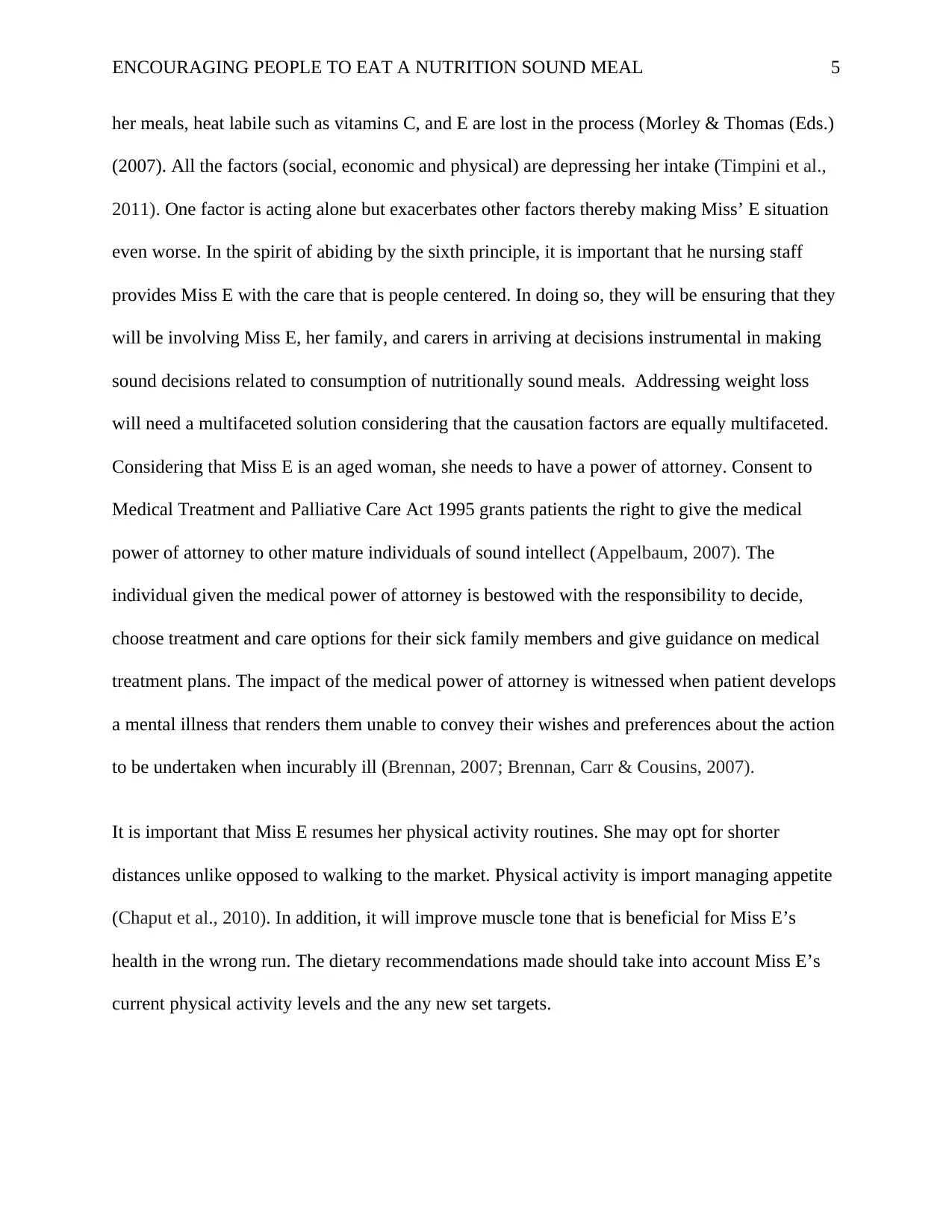
ENCOURAGING PEOPLE TO EAT A NUTRITION SOUND MEAL 5
her meals, heat labile such as vitamins C, and E are lost in the process (Morley & Thomas (Eds.)
(2007). All the factors (social, economic and physical) are depressing her intake (Timpini et al.,
2011). One factor is acting alone but exacerbates other factors thereby making Miss’ E situation
even worse. In the spirit of abiding by the sixth principle, it is important that he nursing staff
provides Miss E with the care that is people centered. In doing so, they will be ensuring that they
will be involving Miss E, her family, and carers in arriving at decisions instrumental in making
sound decisions related to consumption of nutritionally sound meals. Addressing weight loss
will need a multifaceted solution considering that the causation factors are equally multifaceted.
Considering that Miss E is an aged woman, she needs to have a power of attorney. Consent to
Medical Treatment and Palliative Care Act 1995 grants patients the right to give the medical
power of attorney to other mature individuals of sound intellect (Appelbaum, 2007). The
individual given the medical power of attorney is bestowed with the responsibility to decide,
choose treatment and care options for their sick family members and give guidance on medical
treatment plans. The impact of the medical power of attorney is witnessed when patient develops
a mental illness that renders them unable to convey their wishes and preferences about the action
to be undertaken when incurably ill (Brennan, 2007; Brennan, Carr & Cousins, 2007).
It is important that Miss E resumes her physical activity routines. She may opt for shorter
distances unlike opposed to walking to the market. Physical activity is import managing appetite
(Chaput et al., 2010). In addition, it will improve muscle tone that is beneficial for Miss E’s
health in the wrong run. The dietary recommendations made should take into account Miss E’s
current physical activity levels and the any new set targets.
her meals, heat labile such as vitamins C, and E are lost in the process (Morley & Thomas (Eds.)
(2007). All the factors (social, economic and physical) are depressing her intake (Timpini et al.,
2011). One factor is acting alone but exacerbates other factors thereby making Miss’ E situation
even worse. In the spirit of abiding by the sixth principle, it is important that he nursing staff
provides Miss E with the care that is people centered. In doing so, they will be ensuring that they
will be involving Miss E, her family, and carers in arriving at decisions instrumental in making
sound decisions related to consumption of nutritionally sound meals. Addressing weight loss
will need a multifaceted solution considering that the causation factors are equally multifaceted.
Considering that Miss E is an aged woman, she needs to have a power of attorney. Consent to
Medical Treatment and Palliative Care Act 1995 grants patients the right to give the medical
power of attorney to other mature individuals of sound intellect (Appelbaum, 2007). The
individual given the medical power of attorney is bestowed with the responsibility to decide,
choose treatment and care options for their sick family members and give guidance on medical
treatment plans. The impact of the medical power of attorney is witnessed when patient develops
a mental illness that renders them unable to convey their wishes and preferences about the action
to be undertaken when incurably ill (Brennan, 2007; Brennan, Carr & Cousins, 2007).
It is important that Miss E resumes her physical activity routines. She may opt for shorter
distances unlike opposed to walking to the market. Physical activity is import managing appetite
(Chaput et al., 2010). In addition, it will improve muscle tone that is beneficial for Miss E’s
health in the wrong run. The dietary recommendations made should take into account Miss E’s
current physical activity levels and the any new set targets.
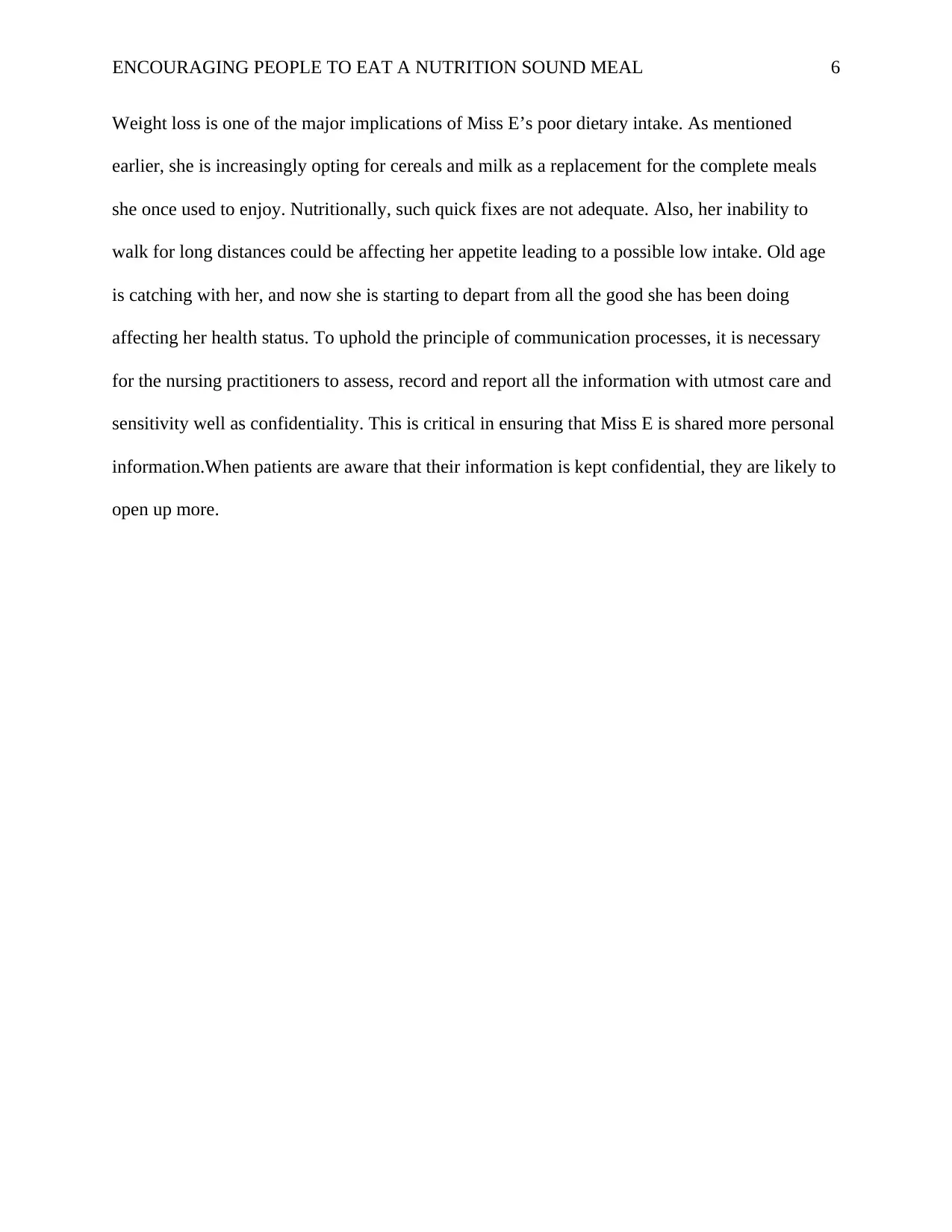
ENCOURAGING PEOPLE TO EAT A NUTRITION SOUND MEAL 6
Weight loss is one of the major implications of Miss E’s poor dietary intake. As mentioned
earlier, she is increasingly opting for cereals and milk as a replacement for the complete meals
she once used to enjoy. Nutritionally, such quick fixes are not adequate. Also, her inability to
walk for long distances could be affecting her appetite leading to a possible low intake. Old age
is catching with her, and now she is starting to depart from all the good she has been doing
affecting her health status. To uphold the principle of communication processes, it is necessary
for the nursing practitioners to assess, record and report all the information with utmost care and
sensitivity well as confidentiality. This is critical in ensuring that Miss E is shared more personal
information.When patients are aware that their information is kept confidential, they are likely to
open up more.
Weight loss is one of the major implications of Miss E’s poor dietary intake. As mentioned
earlier, she is increasingly opting for cereals and milk as a replacement for the complete meals
she once used to enjoy. Nutritionally, such quick fixes are not adequate. Also, her inability to
walk for long distances could be affecting her appetite leading to a possible low intake. Old age
is catching with her, and now she is starting to depart from all the good she has been doing
affecting her health status. To uphold the principle of communication processes, it is necessary
for the nursing practitioners to assess, record and report all the information with utmost care and
sensitivity well as confidentiality. This is critical in ensuring that Miss E is shared more personal
information.When patients are aware that their information is kept confidential, they are likely to
open up more.
⊘ This is a preview!⊘
Do you want full access?
Subscribe today to unlock all pages.

Trusted by 1+ million students worldwide
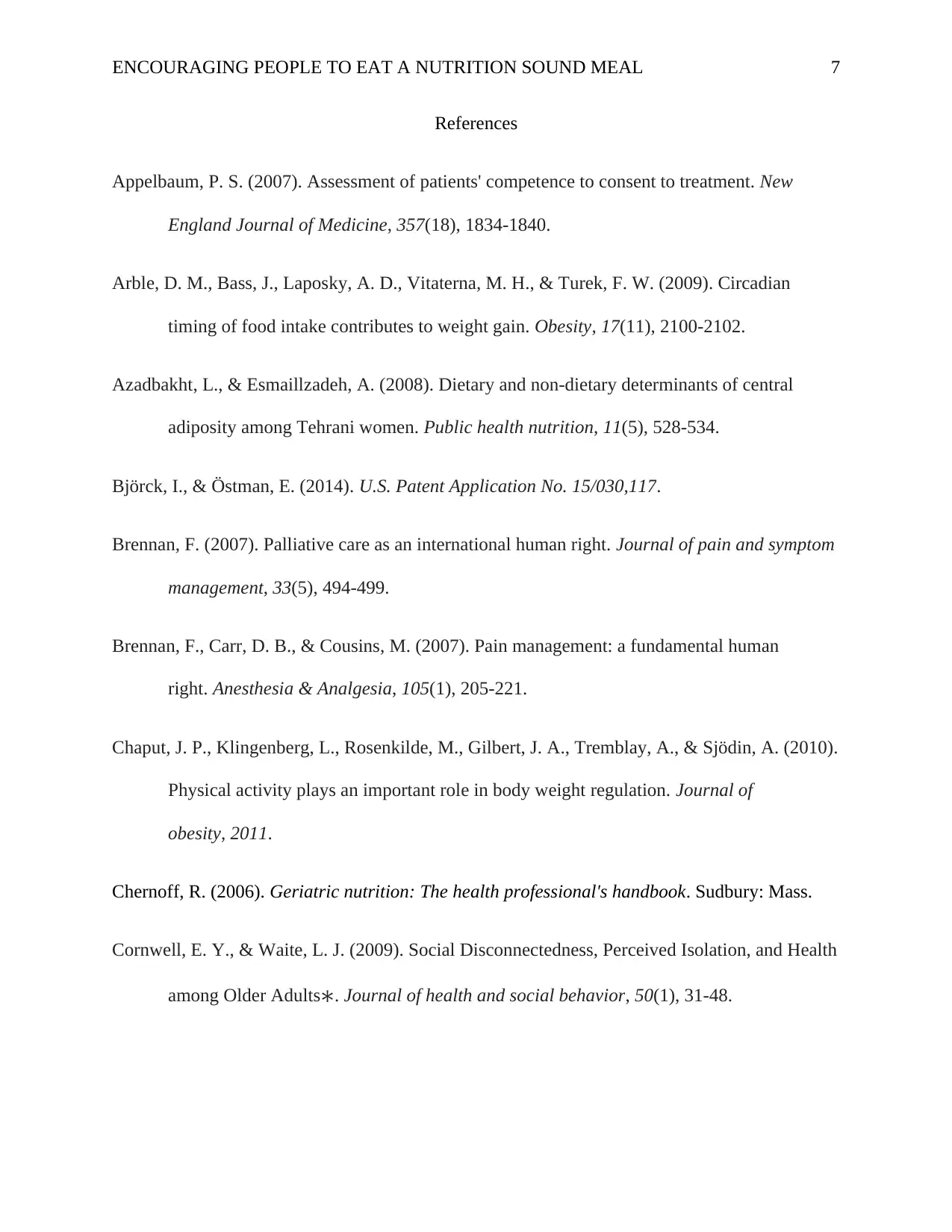
ENCOURAGING PEOPLE TO EAT A NUTRITION SOUND MEAL 7
References
Appelbaum, P. S. (2007). Assessment of patients' competence to consent to treatment. New
England Journal of Medicine, 357(18), 1834-1840.
Arble, D. M., Bass, J., Laposky, A. D., Vitaterna, M. H., & Turek, F. W. (2009). Circadian
timing of food intake contributes to weight gain. Obesity, 17(11), 2100-2102.
Azadbakht, L., & Esmaillzadeh, A. (2008). Dietary and non-dietary determinants of central
adiposity among Tehrani women. Public health nutrition, 11(5), 528-534.
Björck, I., & Östman, E. (2014). U.S. Patent Application No. 15/030,117.
Brennan, F. (2007). Palliative care as an international human right. Journal of pain and symptom
management, 33(5), 494-499.
Brennan, F., Carr, D. B., & Cousins, M. (2007). Pain management: a fundamental human
right. Anesthesia & Analgesia, 105(1), 205-221.
Chaput, J. P., Klingenberg, L., Rosenkilde, M., Gilbert, J. A., Tremblay, A., & Sjödin, A. (2010).
Physical activity plays an important role in body weight regulation. Journal of
obesity, 2011.
Chernoff, R. (2006). Geriatric nutrition: The health professional's handbook. Sudbury: Mass.
Cornwell, E. Y., & Waite, L. J. (2009). Social Disconnectedness, Perceived Isolation, and Health
among Older Adults∗. Journal of health and social behavior, 50(1), 31-48.
References
Appelbaum, P. S. (2007). Assessment of patients' competence to consent to treatment. New
England Journal of Medicine, 357(18), 1834-1840.
Arble, D. M., Bass, J., Laposky, A. D., Vitaterna, M. H., & Turek, F. W. (2009). Circadian
timing of food intake contributes to weight gain. Obesity, 17(11), 2100-2102.
Azadbakht, L., & Esmaillzadeh, A. (2008). Dietary and non-dietary determinants of central
adiposity among Tehrani women. Public health nutrition, 11(5), 528-534.
Björck, I., & Östman, E. (2014). U.S. Patent Application No. 15/030,117.
Brennan, F. (2007). Palliative care as an international human right. Journal of pain and symptom
management, 33(5), 494-499.
Brennan, F., Carr, D. B., & Cousins, M. (2007). Pain management: a fundamental human
right. Anesthesia & Analgesia, 105(1), 205-221.
Chaput, J. P., Klingenberg, L., Rosenkilde, M., Gilbert, J. A., Tremblay, A., & Sjödin, A. (2010).
Physical activity plays an important role in body weight regulation. Journal of
obesity, 2011.
Chernoff, R. (2006). Geriatric nutrition: The health professional's handbook. Sudbury: Mass.
Cornwell, E. Y., & Waite, L. J. (2009). Social Disconnectedness, Perceived Isolation, and Health
among Older Adults∗. Journal of health and social behavior, 50(1), 31-48.
Paraphrase This Document
Need a fresh take? Get an instant paraphrase of this document with our AI Paraphraser
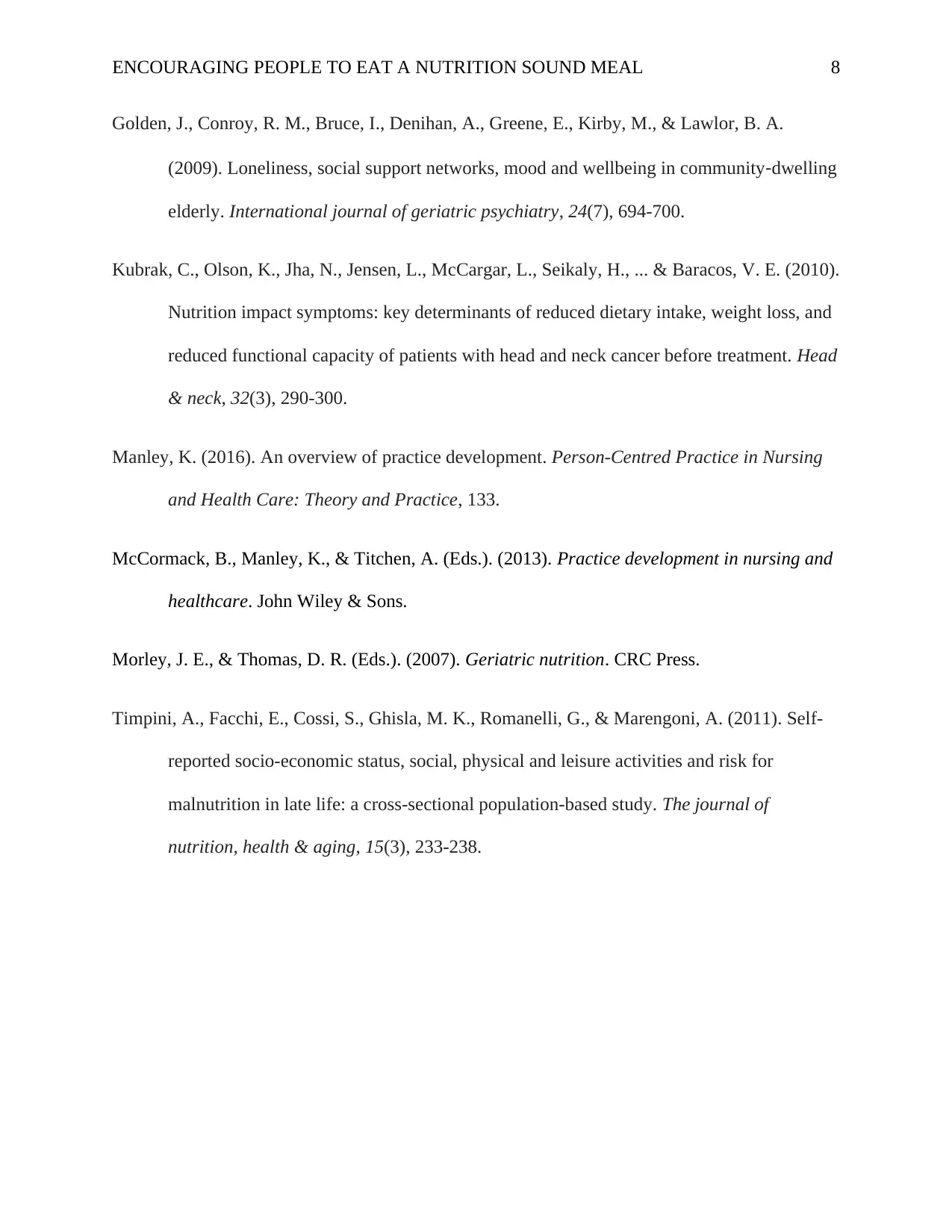
ENCOURAGING PEOPLE TO EAT A NUTRITION SOUND MEAL 8
Golden, J., Conroy, R. M., Bruce, I., Denihan, A., Greene, E., Kirby, M., & Lawlor, B. A.
(2009). Loneliness, social support networks, mood and wellbeing in community‐dwelling
elderly. International journal of geriatric psychiatry, 24(7), 694-700.
Kubrak, C., Olson, K., Jha, N., Jensen, L., McCargar, L., Seikaly, H., ... & Baracos, V. E. (2010).
Nutrition impact symptoms: key determinants of reduced dietary intake, weight loss, and
reduced functional capacity of patients with head and neck cancer before treatment. Head
& neck, 32(3), 290-300.
Manley, K. (2016). An overview of practice development. Person-Centred Practice in Nursing
and Health Care: Theory and Practice, 133.
McCormack, B., Manley, K., & Titchen, A. (Eds.). (2013). Practice development in nursing and
healthcare. John Wiley & Sons.
Morley, J. E., & Thomas, D. R. (Eds.). (2007). Geriatric nutrition. CRC Press.
Timpini, A., Facchi, E., Cossi, S., Ghisla, M. K., Romanelli, G., & Marengoni, A. (2011). Self-
reported socio-economic status, social, physical and leisure activities and risk for
malnutrition in late life: a cross-sectional population-based study. The journal of
nutrition, health & aging, 15(3), 233-238.
Golden, J., Conroy, R. M., Bruce, I., Denihan, A., Greene, E., Kirby, M., & Lawlor, B. A.
(2009). Loneliness, social support networks, mood and wellbeing in community‐dwelling
elderly. International journal of geriatric psychiatry, 24(7), 694-700.
Kubrak, C., Olson, K., Jha, N., Jensen, L., McCargar, L., Seikaly, H., ... & Baracos, V. E. (2010).
Nutrition impact symptoms: key determinants of reduced dietary intake, weight loss, and
reduced functional capacity of patients with head and neck cancer before treatment. Head
& neck, 32(3), 290-300.
Manley, K. (2016). An overview of practice development. Person-Centred Practice in Nursing
and Health Care: Theory and Practice, 133.
McCormack, B., Manley, K., & Titchen, A. (Eds.). (2013). Practice development in nursing and
healthcare. John Wiley & Sons.
Morley, J. E., & Thomas, D. R. (Eds.). (2007). Geriatric nutrition. CRC Press.
Timpini, A., Facchi, E., Cossi, S., Ghisla, M. K., Romanelli, G., & Marengoni, A. (2011). Self-
reported socio-economic status, social, physical and leisure activities and risk for
malnutrition in late life: a cross-sectional population-based study. The journal of
nutrition, health & aging, 15(3), 233-238.
1 out of 8
Your All-in-One AI-Powered Toolkit for Academic Success.
+13062052269
info@desklib.com
Available 24*7 on WhatsApp / Email
![[object Object]](/_next/static/media/star-bottom.7253800d.svg)
Unlock your academic potential
Copyright © 2020–2026 A2Z Services. All Rights Reserved. Developed and managed by ZUCOL.
